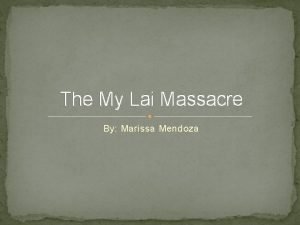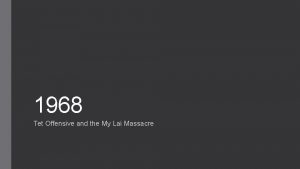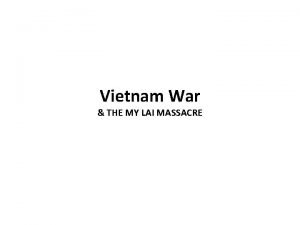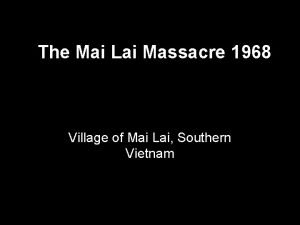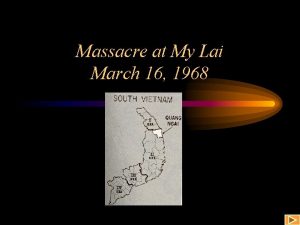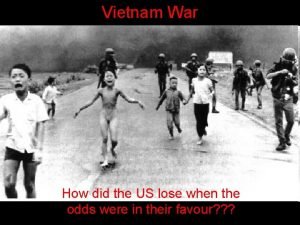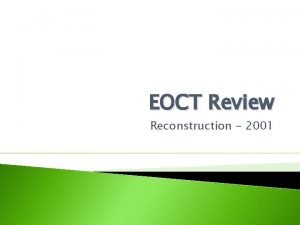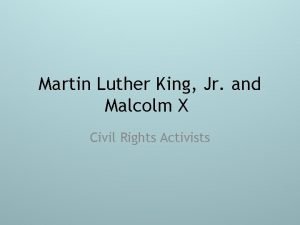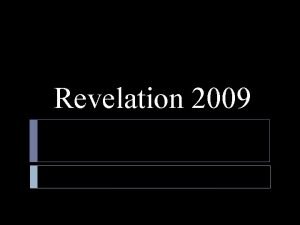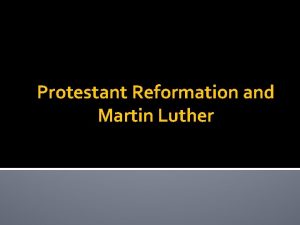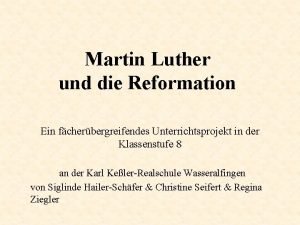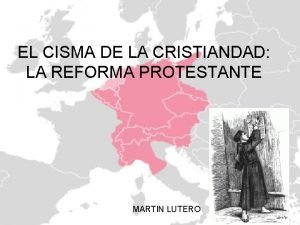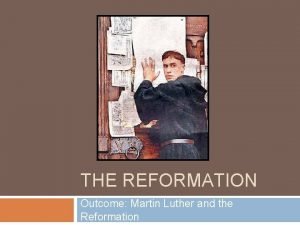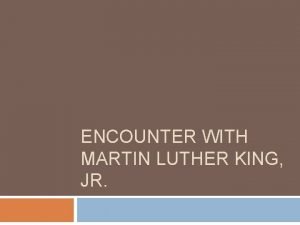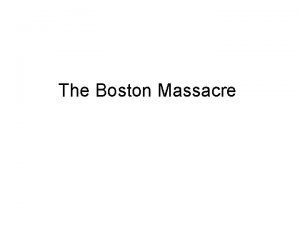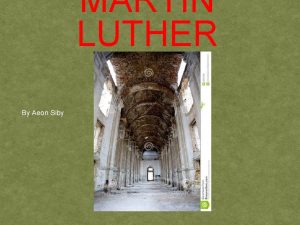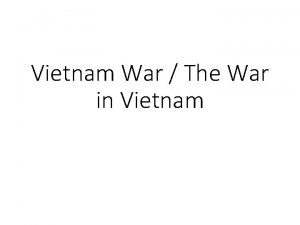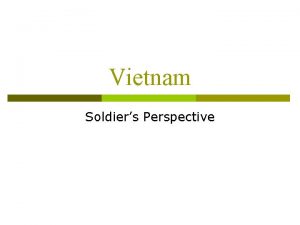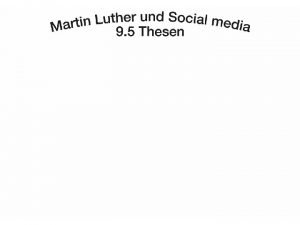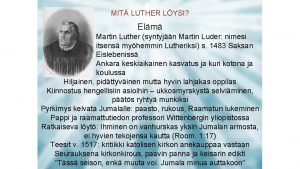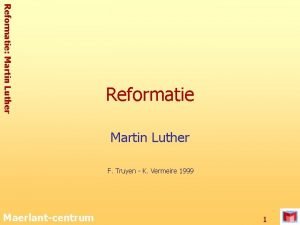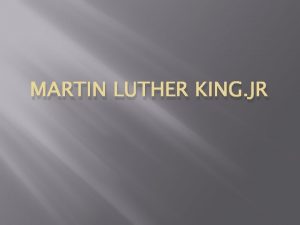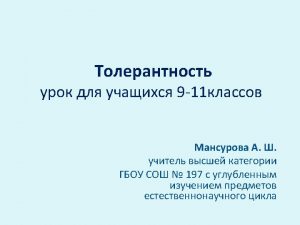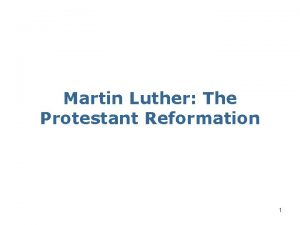Vietnam War THE MY LAI MASSACRE Martin Luther










![Eve of Destruction [3: 37]: https: //www. youtube. com/watch? v=nt. Ls. Elb. W 9 Eve of Destruction [3: 37]: https: //www. youtube. com/watch? v=nt. Ls. Elb. W 9](https://slidetodoc.com/presentation_image_h/1f9725bfb519292e0a09d5dd09349f6a/image-11.jpg)








- Slides: 19

Vietnam War & THE MY LAI MASSACRE


Martin Luther King, speaking out against the war, 1967

John Kerry, speaking out against the war, 1971


The War As Seen at Home CONFLICTING IMAGES




![Eve of Destruction 3 37 https www youtube comwatch vnt Ls Elb W 9 Eve of Destruction [3: 37]: https: //www. youtube. com/watch? v=nt. Ls. Elb. W 9](https://slidetodoc.com/presentation_image_h/1f9725bfb519292e0a09d5dd09349f6a/image-11.jpg)
Eve of Destruction [3: 37]: https: //www. youtube. com/watch? v=nt. Ls. Elb. W 9 Xo Ballad of the Green Berets [2: 16]: https: //www. youtube. com/watch? v=m 5 WJJVSE_BE [Sgt. Barry Sadler] https: //www. youtube. com/watch? v=PX 4 Flhw 0 HSA [Kitschier visuals but better recording. Go from 0: 17 -2: 41] My Lai: The American Experience [1: 10] https: //www. youtube. com/watch? v=H 69 n. Exf. Uh 34

Discussion Questions: Charlie Company 1. Describe the men of Charlie Company. Who are they? Are they “ordinary Americans” or unusual in some way? 2. Which ones do you like the best, and why? Which ones do you dislike? (Try to get to know their names) 3. Which types of missions did they carry out? 4. What challenges and struggles had Charlie Company had prior to the events at My Lai? 5. What’s the relationship between the U. S. soldiers and the Vietnamese villagers? 6. Do you have sympathy for the Vietnamese villagers who know the location of booby-traps but don’t share it with the soldiers? 7. Do you have sympathy for the American soldiers, given the way they treat the Vietnamese villagers?

Stanford University Prison Experiment 1971 24 male college students, screened for psychological problems, criminal history, etc. , are randomly assigned to be “guards” or “prisoners” for a twoweek simulation of prison life. It has to be stopped after only six days…


Socratic Seminar: Procedures I’ll pose a question and then sit back and let the conversation go from there. I’ll only jump in again if the conversation goes far off topic or lags. You should listen to the flow of conversation and respond to it. You don’t need to raise your hand, but you shouldn’t interrupt a speaker before he or she finishes. Don’t prepare things to say; you’ll be graded on how well you build on or challenge the conversation where it is, as well as on the quality of insights or probing questions you ask to deepen the conversation. You may extend the conversation to a new question, but you should wait until the previous question has been well explored.

Socratic Seminar 1: Clarifying Questions 1. What happened at My Lai? 2. What did Hugh Thompson do at My Lai? 3. How did this event become public, and what role did the press and other soldiers play in it? 4. How do the villagers feel about this today? 5. What point did soldiers accused in the My Lai massacre make in their own defense? 6. What was the point of Americans who demonstrated after Lt. Calley’s conviction? 7. What concern did the federal prosecutor have with Nixon’s decision?

Socratic Seminar 2: Probing Questions 1. What role did rank and the responsibility to follow orders have in My Lai? 2. Does rank make a difference in accountability? Do you hold Medina more responsible than Calley, or Calley more responsible than the average soldier? 3. What role does the pressure of war play in these events? 4. Was there anything special about Vietnam, or was this the kind of situation that might arise in any war? 5. What prompted Hugh Thompson to intervene, and what risks was he taking to do so? 6. Why do you feel he was able to intervene when none of the troops on the ground were?

Socratic Seminar 2: Probing Questions 7. What would be an appropriate punishment for individuals involved in My Lai? 8. Did the protesters against Calley’s conviction have any legitimate points? 9. Should the United States compensate survivors and families in My Lai-type incidents, and if so, how? 10. What responsibility do we (Americans at home) have as citizens or non-combatants for an incident like the My Lai massacre? 11. Does My Lai have anything to say about the wisdom of the United States entering into any war, or precautions that it ought to take before doing so?

Hugh Thompson
 Marissa lai
Marissa lai Mai lai massacre primary sources
Mai lai massacre primary sources My lai massacre
My lai massacre Mai lai village
Mai lai village Mai lai massacre primary sources
Mai lai massacre primary sources Kop chai lai lai
Kop chai lai lai ưu thế lai là gì
ưu thế lai là gì Korean war vietnam war venn diagram
Korean war vietnam war venn diagram Reconstruction venn diagram
Reconstruction venn diagram Malcolm x
Malcolm x Martin luther revelation
Martin luther revelation The reformation quiz
The reformation quiz Boar'd to death
Boar'd to death Protestant reformation martin luther political cartoon
Protestant reformation martin luther political cartoon Martin luther lebenslauf unterrichtsmaterial
Martin luther lebenslauf unterrichtsmaterial Martin luther and his wife
Martin luther and his wife What drove martin luther to write the 95 theses
What drove martin luther to write the 95 theses Martin luther kritik
Martin luther kritik What was martin luther king
What was martin luther king Encounter with martin luther king jr summary
Encounter with martin luther king jr summary
